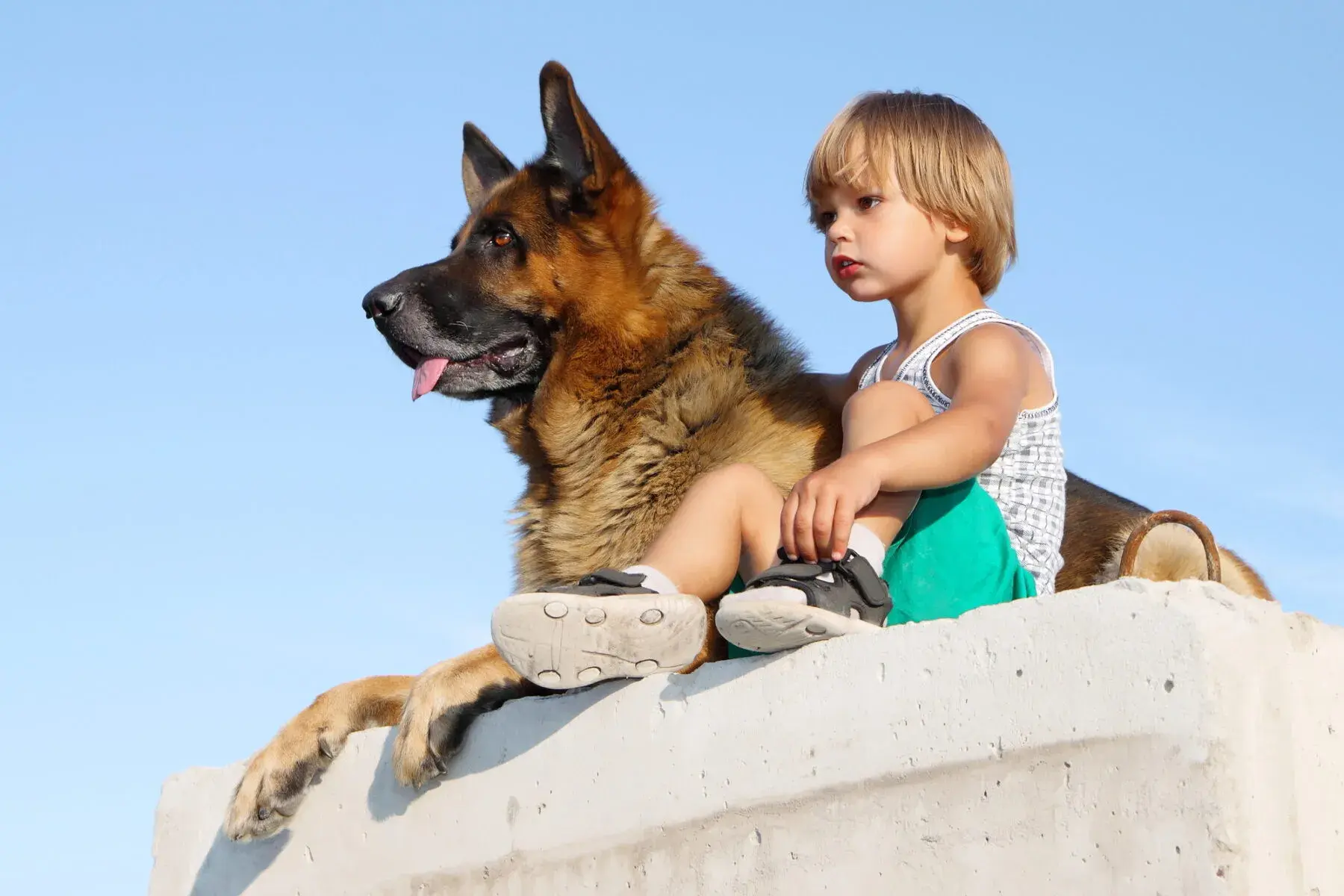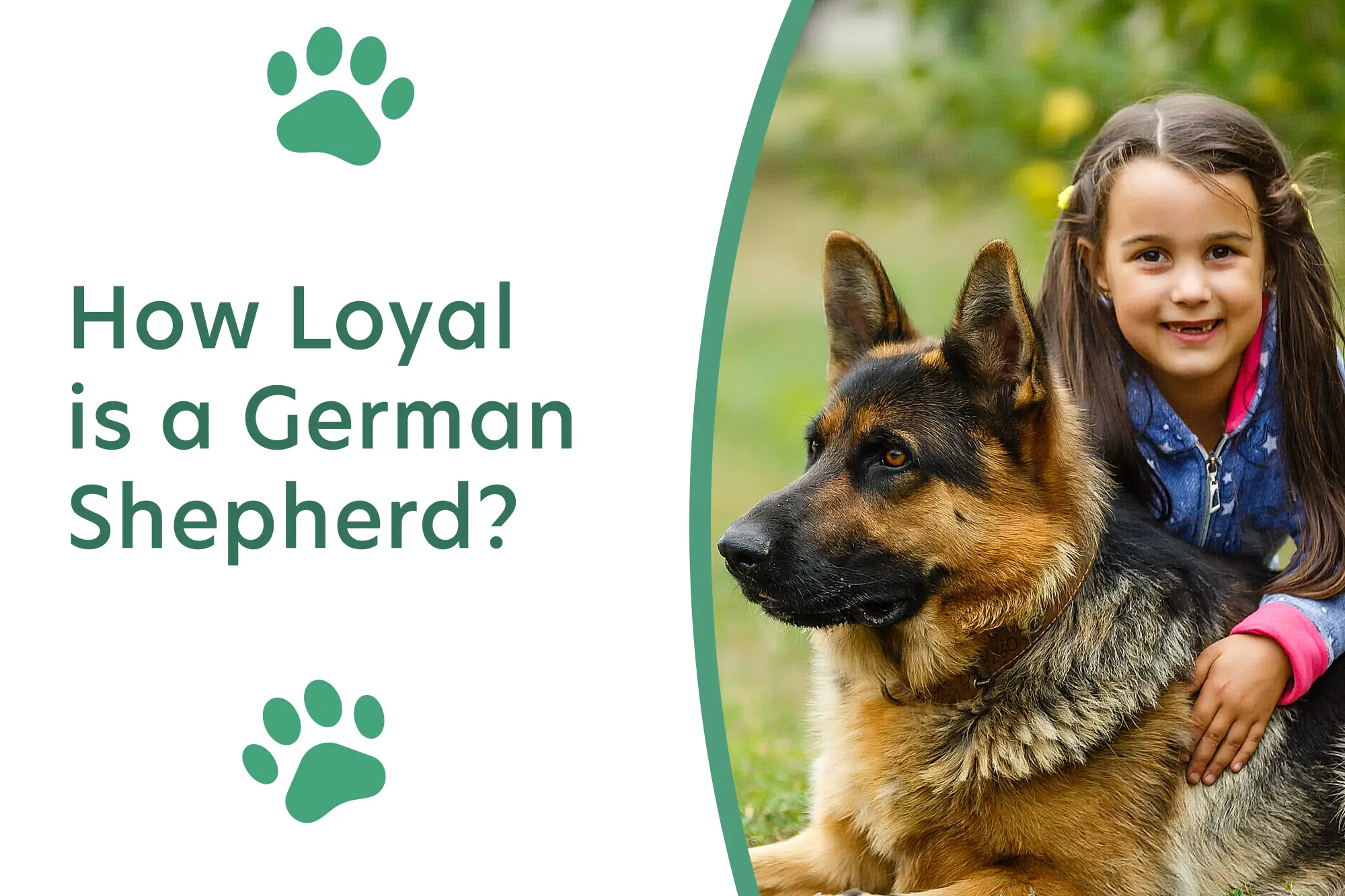The German Shepherd is a breed known for its intelligence, devotion, and unwavering loyalty to its human companions. A true working dog, the German Shepherd has earned its reputation as a fearless and reliable partner, both at home and in the field. But just loyal are they? Read on to find out.
History of The German Shepherd Breed

German Shepherds originated in Germany in the late 19th century, bred specifically for the purpose of herding sheep and protecting livestock. With their keen intelligence, physical strength, and agility, the German Shepherd quickly gained recognition as one of the best working dog breeds. Over time, their role expanded to include law enforcement, military, and search and rescue operations, further solidifying their status as trustworthy and dedicated companions.
Traits That Contribute to Their Loyalty

Intelligence
Ranked among the top three most intelligent dog breeds, German Shepherds possess an incredible capacity for problem-solving and learning. This high level of intelligence allows them to quickly understand and adapt to their owner’s needs and commands, fostering a strong bond and a deep sense of loyalty to their family members.
Protective Nature
By nature, German Shepherds are instinctive protectors. They exhibit an innate ability to guard their human family, property, and even other household pets. Their alertness and powerful presence make them excellent watchdogs, always keeping a vigilant eye out for any potential threats to their loved ones.
Trainability
German Shepherds are eager to learn and easy to train, thanks to their intelligence and desire to please their owners. Beginning with early socialization and proper training, German Shepherds excel in a variety of dog sports and disciplines, such as obedience, agility, and Schutzhund – a German sport focused on tracking, obedience, and protection work.
Compatibility with Their Human Family
A well-socialized and trained German Shepherd is a loyal and affectionate companion, capable of forming a deep bond with its owner and family. Adaptable to their owner’s lifestyle, German Shepherds thrive on their family’s love and attention, making them a loving and devoted companion for life.
The German Shepherd’s Loyalty in Action
Numerous stories of German Shepherds saving their owners’ lives or displaying exceptional acts of loyalty provide testament to their unwavering devotion. From protecting children from dangerous animals to alerting family members to fires and medical emergencies, these acts of bravery showcase the German Shepherd’s commitment to its family.
Here are some videos showcasing German Shepherds in action:
@lifewithkobi_gsd Protection like no other #dogsoftiktok #gsd #dog #waitforit #protection #workingdog #germanshepherd #puppy #gsdoftiktok #dogsoftiktok ♬ Get You The Moon – Kina
Common Misconceptions About German Shepherds
Despite their reputation for loyalty and companionship, there are some common misconceptions about German Shepherds. Properly socialized and trained German Shepherds are not aggressive, but protective in nature. They can be great with children and other pets, provided they are raised alongside them.
Misconception 1: German Shepherds are Aggressive
Partially because of their ubiquitous use in police and military roles, German Shepherds have garnered an unfair reputation for being aggressive. The reality, however, is quite different. They are instinctively wary of strangers and can be protective towards their family, but that does not equate to aggression.
German Shepherds are, in fact, incredibly versatile, capable of working as guide dogs for the blind, search and rescue dogs, and even therapy dogs, roles that require a temperament compatible with mellow amiability instead of aggression. Naturally, like any breed, there are individual differences in temperament, and a German Shepherd poorly socialized or trained can potentially exhibit aggressive behavior.
The burden lies with potential owners to invest time in proper socialization and positive reinforcement training to assure that their German Shepherds grow to be well-adjusted, friendly dogs, capable of discerning between genuine threats and benign encounters.
Misconception 2: German Shepherds Aren’t Good With Kids or Other Pets
German Shepherds, due to their large size and high energy level, are sometimes believed to be a poor choice for families with children or other pets. Yes, they are large and energetic, but these qualities need not translate into a threat to children or other small pets.
This breed has a well-documented history of being patient with kids, often playing the role of a gentle, protective big brother or sister. In the same vein, German Shepherds can coexist peacefully with other pets, when properly introduced and socialized — often forming close bonds with them.
Misconception 3: German Shepherds are Overly Possessive
There’s no denying it — German Shepherds form a close bond with their family and are protective. However, labeling this breed as ‘overly possessive’ would be akin to painting an exaggerated, one-sided picture. Their dedication to their family can often be mistaken for possessiveness. They were originally bred to be protectors afterall.
How to Build and Maintain a Strong Bond with Your German Shepherd

Building a strong bond with your German Shepherd will guarantee a lifetime of loyalty and companionship. Establishing this bond starts when they’re still puppies, and continues throughout their adult life with quality time spent playing, training, exercising, and providing mental stimulation. That said, the following are ways you can build a strong bond with your GSD:
1. Prioritize Socialization
Socialization is a key element in building a strong bond with your German Shepherd. The process begins while the dog is still a puppy and continues throughout its life. The primary objective is to expose your dog to a variety of people, environments, situations, and other animals.
This aids in developing confidence in your German Shepherd, reducing anxiety, and promoting healthy interactions. Thus, socialization forms the fundamental layer of your bond.
2. Invest in Training
Training is not just about teaching tricks — it’s about establishing communication, setting boundaries, and understanding each other better. Training your German Shepherd should involve reward-based methods. It’s not just about obedience either; you could engage your pet in agility or scent work, treat puzzles, and other games to stimulate their intelligence.
Remember, training is a two-way street. As much as your German Shepherd is learning about you, you are also learning about them — their strengths, weaknesses, preferences, and limits.
3. Exercise, Exercise, Exercise
German Shepherds are a high-energy breed. They require regular physical and mental stimulation to stay healthy and happy. Regular exercise will not only keep your German Shepherd physically fit but also improve their mood and behavior.
Doing activities together, like going for a run, hiking, or playing fetch, can go a long way in strengthening your bond. These shared experiences can be an enjoyable bonding time, where you both earn each other’s trust and respect.
4. Consistency is Key
Being consistent with rules and routines is another crucial factor in building a strong bond. Dogs thrive on consistency as it gives them a sense of security and helps them understand what is expected of them. So, keeping meal times, play times, and training sessions consistent is beneficial for developing a bond.
5. Quality Time Matters
Spend quality time with your German Shepherd. This can be as simple as petting them while watching TV, brushing their coat regularly, or just hanging out together in the garden. Such shared moments may seem mundane, but they usually mean the world to your dog.
6. Communication is Important
Clear, consistent communication is a pillar of any great relationship, even with your German Shepherd. Use firm, but calm, commands and try to understand your dog’s body language. An empathetic approach to communication goes a long way in cementing your bond.
7. Health and Nutrition
A well-fed dog is a happy dog, and a happy dog is more likely to form a healthy bond with its owner. Providing your German Shepherd with a balanced, nutritious diet shows them that you care about their wellbeing.
Regular vet visits and timely vaccinations are also important. Being proactive about your German Shepherd’s health is a clear message of your love and care — messages that help form an unbreakable bond.
Conclusion
The German Shepherd’s unwavering loyalty and devotion make them true companions, always by their owner’s side. Their intelligence, trainability, and protective nature all contribute to the deep bond they form with their human family. By investing in a strong relationship with your German Shepherd, you’re ensuring a lifetime of love, loyalty, and companionship.
